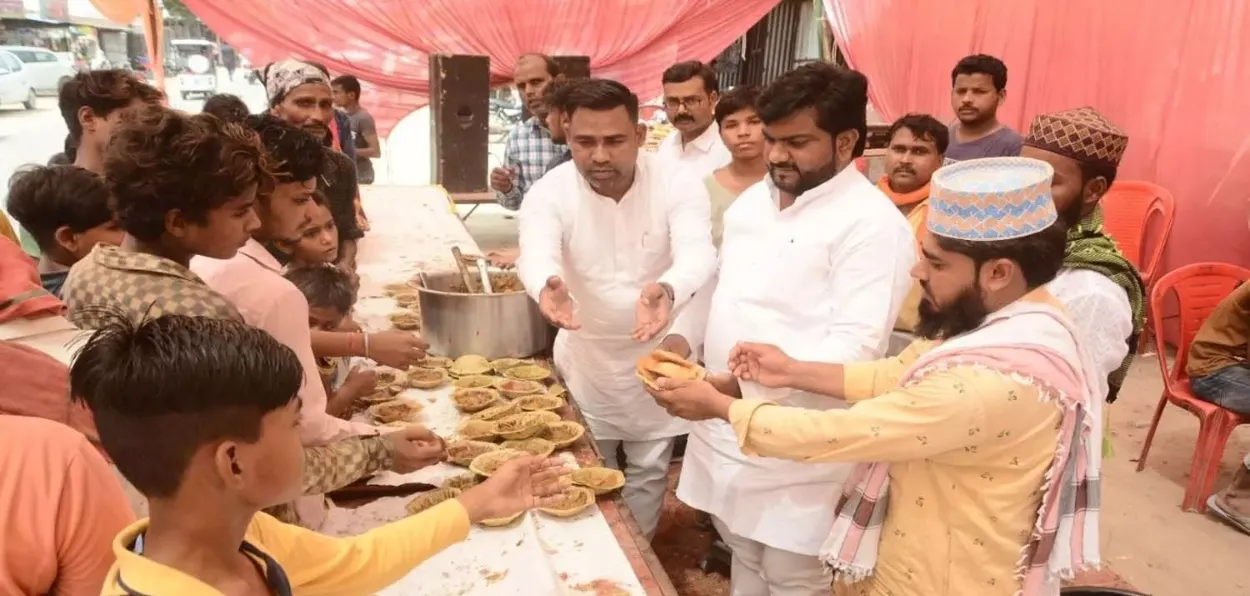
Vidushi Gaur/Lucknow
Bada Mangal, or Bade Mangalvar, a socio-religious festival celebrated across the Lucknow city and around on Tuesdays of the Jyeshtha month of the Samvat Calendar, has originated from the action of a Royal Begum of the Nawabi era, who believed the divine had asked her to build a temple devoted to Lord Hanuman.
Janab-e-Alia, the second wife of Shuja-ud-Daulah, the third Nawab of the Oudh Kingdom (which included Lucknow) from 1753 to 1775 A.D., saw a dream in which a divine presence instructed her to build a temple of Lord Hanuman at a specific place.
The dream indicated a place where a Hanuman idol was buried. The Begum ordered the excavation of the site, and upon finding the idol, she arranged for it to be transported to Lucknow on an elephant.
However, the elephant refused to move after covering a certain distance. Interpreting this as another divine signal, the Begum decided to construct the temple at that very spot, which is today’s Aliganj.
Muslims of Lucknow distributing Prasad on Bada Mangalvar
Since then, people have gathered at this Hanuman temple in Lucknow every year during the four Tuesdays of Jyestha (which falls between May and June), to seek blessings of the Lord Hanuman.
This historical intertwining of Hindu and Muslim traditions laid the foundation for a unique cultural celebration that transcends religious boundaries.
Weeks before the festival, the entire city, including its Muslim residents, begins preparing for Bada Mangal. Temples dedicated to Lord Hanuman are cleaned and decorated with flowers and lights. The Aliganj Hanuman Temple, one of the oldest and most revered, is the focus of all festivities.
In the narrow lanes of the old city, Muslims join hands with their Hindu neighbours to set up stalls for Prasad (consecrated food). This prasad, including delicacies like puri, halwa, andboondi, is prepared in large quantities to be distributed among the devotees. Volunteers from both communities work side by side, embodying the spirit of unity and cooperation.
On the day of Bada Mangal, the city awakes to the melodious sounds of temple bells and devotional songs. Devotees throng the temples to offer their prayers to Lord Hanuman. The temples, especially the Aliganj Hanuman Temple, are adorned with garlands and shimmering lights to create a festive atmosphere.
Muslim families set up stalls along the procession routes, distributing water, sweets, and snacks to the devotees. Muslim artisans and craftsmen play make intricate decorations and contribute to the grandeur of the celebrations. These artisans, like their ancestors, take immense pride in being part of a festival that brings the entire city together.
The main procession, starting from the Aliganj Hanuman Temple, draws thousands of people. As it moves through the streets, residents from all communities line up to offer flowers, light incense sticks and wave little flags in devotion. The sight of Hindus and Muslims standing shoulder to shoulder and celebrating a Hindu festival is a powerful testament to the city's enduring spirit of harmony.
Amidst the festive chaos, numerous stories of unity and compassion unfold. In one neighbourhood, a Muslim family hosted a feast for their Hindu friends and neighbours, reinforcing the bonds of friendship that transcend religious lines.
Prasad being distributed outside Hanuman Mandir, Aliganj
In another, a group of Hindu and Muslim women collaboratively organised a prasad distribution drive, ensuring that the sacred offerings reached every corner of the city.
"This festival is about love and service," he said with a smile. "We may pray differently, but our hearts beat together for Lucknow."
ALSO READ: Modi 3.0 team comprises 72 ministers with experience and young faces from 24 states
While Bada Mangal has embraced modern elements, its core values of unity and brotherhood remain unchanged. Environmental consciousness also found a place in the celebrations, with efforts to use eco-friendly materials and minimize waste.
